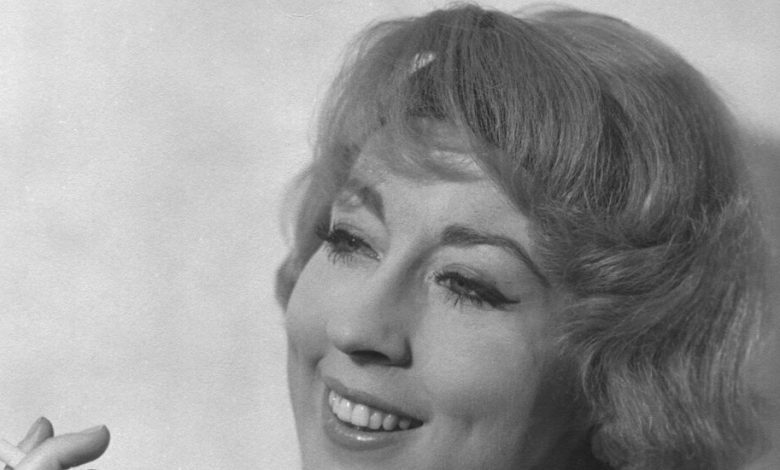Silver Saundors Friedman, Who Helped Found the Improv, Dies at 89

Silver Saundors Friedman, a former Broadway chorine whose hankering for an affordable after-work hangout in Manhattan inspired her future husband to open the original Improvisation, the grandfather of comedy clubs, which she later owned outright, died on Dec. 3 in Santa Monica, Calif., She was 89.
Her death, in a hospice, was caused by a hemorrhagic stroke, her daughter Zoe Friedman said. Budd Friedman, her former husband, died on Nov. 12 at 90.
For years Ms. Friedman auditioned talent for the club, in the theater district, helping to launch the careers of many famous comedians. And she operated it by herself for more than a decade after the couple divorced.
When they opened the Improv in 1963, they were so cash poor that they set up shop in a former Hell’s Kitchen coffeehouse, a leased space on West 44th Street near Ninth Avenue, because they couldn’t afford a liquor license. Then they ran out of money remodeling the place — after stripping paneling from the walls — and decided to leave bare brick as the backdrop to its tiny stage.
With an open mic available for impromptu appearances, the club became a platform for established comedians to experiment with new material before a sophisticated audience and a springboard for fledgling comics. On a given night Robert Klein, Jay Leno, Richard Pryor or Lily Tomlin might mount the stage. The Improv became a model for comedy clubs across the country.
The Friedmans ran the New York club and later a branch in Hollywood until their divorce was finalized in 1979. Ms. Friedman was granted rights to the brand in New York, and Mr. Friedman retained the club in California, which he started in 1975.
He opened 22 others in 12 states west of the Mississippi. He and his partner, Mark Lonow, sold their company in 2018 to Levity Entertainment, which later expanded the Improv chain to 25.
Ms. Friedman was born Silver Schreck on Aug. 28, 1933, in Los Angeles and raised in Chicago. She was named for Sime Silverman, the founder of the entertainment trade newspaper Variety, where her father, Jay, was an editor. Her mother, Isabelle (Brown) Schreck, worked as an executive assistant for the Marshall Field department store company in Chicago.
Silver Schreck graduated with an associate degree from Chicago Teachers College, now Chicago State University.
She changed her surname when she decided to pursue a singing career. Her daughter Zoe explained:
“With a first name like Silver, it was important that her stage name didn’t make her sound like a stripper. Silver Slippers could have been a great stripper name, but that wasn’t who my mom was. So she and a friend came up with a few options that made Silver sound legit. Saundors was the winner. First audition after claiming that name, the casting person yelled, ‘Silver Sandals. Silver Sandals.’ To which my mom said, ‘It’s Saundors.’ And he said, ‘Just shut up and sing.’”
Ms. Friedman is also survived by another daughter, Beth Friedman; and a grandson.
Ms. Friedman fared better on Broadway, Mr. Friedman recalled in “The Improv: An Oral History of the Comedy Club That Revolutionized Stand-up” (2017), which he created with Tripp Whetsell. She was appearing in the chorus of “Fiorello” on Broadway when she met Mr. Friedman at Logan Airport in Boston as both were headed for New York from Nantucket, Mass., he with dreams of becoming a Broadway producer.
When he tried to date her, she begged off, she said in the oral history, explaining that she was already seeing someone else. Eight months later, when she was cast in the chorus of the hit “How to Succeed in Business Without Really Trying,” they met again.
“After the show got out each night, Silver and I would go out to eat with some of the cast to places like Sardi’s and Downey’s in the theater district, which none of them could afford on a chorus kid’s salary,” Mr. Friedman told The Washington Times in 2017.
“My idea was to open something up in the theater district that was affordable, and where they could get something cheap to eat, sing if they wanted to, and where I could expand my contacts enough to maybe produce my first show,” he said. “It was never going to be anything but a temporary venture.”
They married six months after the Improv opened.
“Even though we continued to present singers for many years to come, about six months after I opened, a very popular comedian named Dave Astor came in and asked if he could do a few minutes,” Mr. Friedman said. “It gradually evolved from there.”
“Anything went, which is how I came up with the name ‘the Improvisation,’” he said.
Ms. Friedman would audition prospective comedians on the first Sunday of each month. She rejected Eddie Murphy on his first tryout for being “too vulgar,” Mr. Friedman recalled, although Mr. Murphy eventually honed his act and performed at the Improv in Los Angeles.
Comics still get laughs at the Improv’s franchises across the country, but Ms. Friedman closed the original New York venue in 1992. She blamed television for the decline in customers.
“They demystified it,” she told The New York Times in 1994. “They made it common.” She added, “You can stay home and see all the bad comedy you want.”
